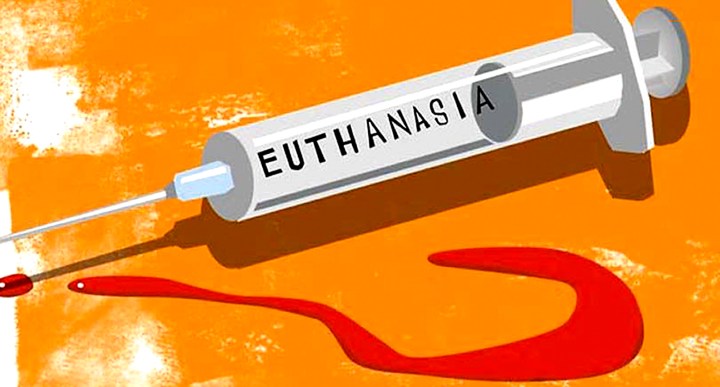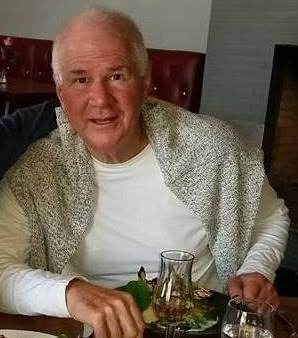GROUNDUP
A dying man makes his case for legalising euthanasia

“My biggest fear is that when my love of life reaches the stage of fearing life, I will not be able to die,” says Diethelm Harck.
First published in GroundUp.
Diethelm Harck speaks in a slow, often indistinct monotone. This, he told Judge Neel Claason on Monday, was a “live demonstration” of the impact motor neuron disease (MND) has had on his life. It’s exhausting merely to communicate.
Judge Claason, now retired, is sitting as a commissioner hearing the evidence of Harck and Dr Suzanne Walter, a palliative care specialist, in their bid to legalise euthanasia in South Africa.
The actual trial has yet to be set down for hearing. Both Harck and Walter, who has multiple myeloma, may not live long enough or be well enough by then to tell their personal stories and back up their legal claim to be allowed to choose how and when to die and for consenting medical practitioners to assist them.
Together they have set up a trust to fund any project or cause, including litigation, which seeks to develop the common law in South Africa to allow both physician-assisted suicide (PAS) (where the doctor prescribes and the patient self-administers) and physician-assisted euthanasia (PAE) (where the doctor administers any medicine to end life).
During the hearing, conducted via Zoom, Hack, 71, told of how he was diagnosed in 2013. From being a physically active person who ran marathons, ultra-marathons and enjoyed hiking and cycling he now walks with a stick, using his spare hand to steady him. In the mornings he does a conservative exercise routine, eats breakfast and then showers. This takes more than three hours. He cannot tie his shoelaces, or button his shirt. He cannot use a hammer or a screwdriver. He gets out of breath easily. He is clumsy and falls and has broken bones.
He said in his evidence, that he loves life “but my biggest fear is that when my love of life reaches the stage of fearing life, I will not be able to die.”
Harck said his deterioration would be progressive. His muscles are weakening and eventually, his diaphragm will stop working so that he is unable to breathe.
“From what I have seen and witnessed, MND death is not peaceful,” he said. “I have seen a number of colleagues and [support] group members pass away. They had no way to communicate. And they could not breathe easily.”
“We once visited a young girl suffering from MND, who was totally paralysed. She could only speak with the help of an eye gaze machine. When Lynn [Harck’s life partner] asked her what she feared the most, she said not being able to die.”
Harck said he wanted to decide when and which way he would leave this earth and felt disempowered by the fact that he could not choose.
He said the moment he feared living any longer, he would express his wish and he wanted the law to allow a physician to help him die.
The Health Professions Council of South Africa and the Ministers of Health, Justice and the National Director of Public Prosecutions, are opposing the application.
They claim palliative care, which is available to most South Africans, alleviates suffering and a continued ban on euthanasia was necessary to protect the right to life.
Harck will be cross-examined on Tuesday and Walters will give evidence later in the week. DM



















 Become an Insider
Become an Insider
The real tragedy is that the applicable current laws are so callously misaligned with compassionate humanism that it must come to this sort of case to shake the system out of its somnolent reverie. And still there are those unfeeling individuals who insist—and literally say just about anything in defence of their insistence—that people like Diethelm Harck and Suzanne Walter are only allowed to die in the most abject, cruel, and wretched circumstances when nature decides that they and their loved ones have suffered enough and that their time is finally up.
It’s high time the Constitutionally guaranteed right to dignity be allowed to extended beyond puerile slippery slope conjectures and outmoded popular superstitions.
“They claim palliative care alleviates suffering and a continued ban on euthanasia was necessary to protect the right to life.”
“They claim palliative care alleviates suffering …” . . .
Absolute hogwash. Palliative care may relieve _SOME_ suffering, but by no means all. I cannot see why an adult person, in full possession of his or her faculties, should not be allowed to end his or her life under some circumstances. . .
” … and a continued ban on euthanasia was necessary to protect the right to life” . . .
Protect it from whom?
P.S. Sorry about the partial post above.
Ooh! DM allows us paragraph breaks in our comments now.
Excellent!
Thank you
This is all stupid. The gentleman could end his life in a hundred ways that the Law cannot prevent. Allow people to do so in a more dignified manner! Yes, doctors should not by law be compelled to participate. As things stand only people with a living will and a good hospice doctor (they are all good) have an exit, and that exit is long after those people would have preferred. I choose to leave the way I want to be remembered. That should not have to mean suicide.
All the bodies opposing Euthanasia allow, support, facilitate abortions. Mothers to be or not to be thus, rightly so, have the right to determine whether their child will live or die. So how is this different from someone making this decision for themselves?